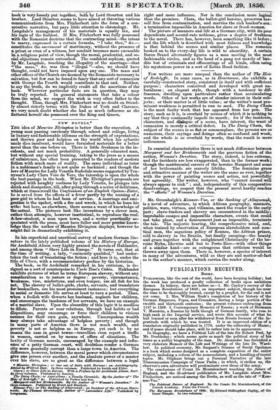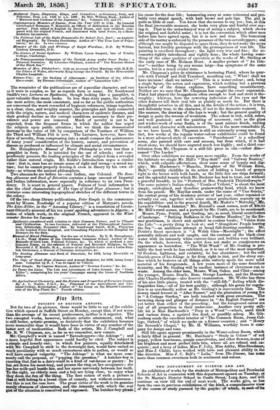PUBLICATIONS RECEIVED.
BOOKS.
PUBLISHERS, like the rest of the world, have been keeping holiday ; but the week has produced a goodly collection of books upon ambitious themes. In history, there are before us-1. Mr. Cayley's survey of the European Revolutions of 1848; an important subject, though too near the time to be thoroughly treated, except by a prophet, for the end is not yet come. 2. Mrs. William Busk's completion of her history of the German Emperors, Popes, and Crusaders, during a large portion of the twelfth_ and thirteenth centuries ; the present volumes embracing from 1197 to 1268. 3. Contemporary Memoirs of Russia; a work of Hermann V. Manstein, a Russian by birth though of German family, who rose to high rank in the Imperial service, and wrote this account of what he had learned or seen after his withdrawal from Russia because of the in- gratitude with which he was treated. It is an improved edition of a translation originally published in 1770, under the editorship of Hume ; , and if peace should take place, will be rather late in its appearance. In biography, we have a Political Life of the late Sir Robert Peel, by Mr. Doubleday ; which seems quite as much the political story of his times as a public biography of the man. Dr. Alexander has furnished a very elaborate Memoir of the Life and Writings of the late Dr. Ward- law. In political economy, Mr. Sargant's Science of Social Opulence is a book which seems designed as a complete exposition of the entire subject, including a reform of the and a handling of recent topics. Mr. Oliphant brings out a Personal Narrative of the late Transcaucasian Campaign of Omar Pasha ; in which, it strikes us, the 1 observer's own adventures will predominate over those of the army. The conclusions of Count De Montalembert touching the future of England, and the ill-advised publication of Mr. Langdale about Mrs. , Fitzherbert, are noticed among the Books, as well as the tale of "Ken- 1 nee-Voo."
1 The Political Ashore of England. By the Comte De Montalembcrt, of the
French Academy. From the French.
The European Revolutions of 1848. By Edward Stillingfleet Coley, of the Inner Temple. In two-yohrmee. Medical Popes, _Emperors, Kings, and Crusaders; or Germany, Italy, and Palestine, from A.D. 1125 to A.D. 1268. By Mrs. William Busk, Author of "Manners-and Customs of the Japanese," &c. Volumes III. and IV. Contemporary Memoirs of Russia, from the Year 1727 to 1744. By General Christopher Hermann V. Manstein, an Officer of distinction in the Russian service. First edited in English by David Hume, and now reedited, com- pared with the original French, and illustrated with brief Notes, by a Hert- fordshire Incumbent.
The Political Life of the Right Honourable Sir Robert Peel, Bart. : an Analyti- cal Biography. By Thomas Doubleday, Author of " The True Law of Popu- lation," Acc. &c. In two volumes.
Memoirs of the Life and Writings of Ralph Wardlaw, D.D. By William Lindsay Alexander, D.D.
The Science of Social Opulence. By William Lucas Sargent, late of Trinity College, Cambridge.
she Transcaucasian Campaign of the Turkish Army under Omar Pasha : a
Personal Narrative. By Laurence Oliphant, Author of " The Russian Shores of the Black Sea."
Memoirs of Mrs. Pitzherbert ; with an Account of her Marriage with H.R.H. the Prince of Wales, afterwards King George the Fourth. By the Honourable Charles Langdale..
Kenwee-Too ; or the Sacking of Allaroonah : an Incident of the African Slave-trade. By ,Thomas Greenhalgh, Author of " Lancashire Life."
The remainder of the publications are of a peculiar character, and run as it were in couples, so far as regards form or name. Dr. Southwood Smith's two Lectures on Epidemics, though looking like a pamphlet, is more valuable than many books. In less than sixty pages, the earliest, the most active, the most consistent, and so far as the public authorities are concerned the worst rewarded of hygienic reformers, brings together, in it clear, close, and weighty manner, the principles and facts connected with the origin, nature, and medical characters of epidemic diseases, and their gradual decline as the corrupt conditions necessary to their pre- valence and power are removed. Much of novelty is not to be expected, from the frequent forms in which the author has urged the subjects upon public attention ; but we think the demonstrated increase in the value of life by comparison of the Tontines of William the Third and William Pitt is new. The Lectures, however, have the force of novelty, from compressing into a small compass the quintessence of many years' consideration of the history, nature, and prevention of disease as produced or influenced by climate and social circumstances.
Dr. Humphreys's Manual of Moral Philosophy is even less than a pamphlet in form. It is intended for the use of schools ; and com- pendiously presents the leading principles of the subject from a revealed rather than natural origin. Mr. Riddle's Introduction urges a similar view : that is, man hack an innate sense of right and wrong—a moral na- ture; but he cannot .properly develop it even in theory by his own ef- forts—as witness the ancient philosophers.
Two almanacks are before us—one Indian, one Colonial. The Bom- bay Almanac and Book of Direction contains a large amount of Imperial and Indian information, more especially in reference to its own Presi- dency. It is scant in general papers. Fulness of local information. is also the chief characteristic of The Cape of Good Hope Almanac; but it contains some interesting topographical sketches of the different towns in
the colony. e •
Of the two cheap library publications, Peter Simple is the commence- ment by Messrs. Routledge of a popular edition of Marryat's novels. The Lion-Killer, in the " Amusing Library," is a translation of Lieute- nant Gerard's account. of ten. years' sporting adventures inAlgeria ; a notice of which work, in the original French, appeared in the West- minster Review for January.
_Epidemics considered with relation to their Common Nature, and to Climate and Civilization. In two Lectures, delivered at the Philosophical Institu tion, Edinbufgh. November 1855. By Southwood Smith, M.D., Physician to the London Fever Hospital, and Consulting Physician to the Hospital for Diseases for the Skin.
Manual of Moral Philosophy. For the use of Schools. By E. R. Humphreys, LL.D., Head Master of the Cheltenham Grammar School, Author of the Manuals of Civil Law, Political Science, 80. To which is prefixed a pre- limivary Essay, on the relation of Natural and Revealed Religion, by the Reverend J. E. Riddle, M.A., Author of an English-Latin and a Latin-Eng- lish Dictionary, a Manual of Christian Antiquities, he.
The Bombay Almanac and Book of Direction, for 1856, being Bissextile or Leap-year.
The Cape of Good Hope Almanac and Annual Register, for 1856, being Leap. year. Compiled by B. J. Van de Sandt de Villiers.
_Peter Simple. By Captain Merryat, Author of " Newton Forster," he. he. Le Tamer des Lions. The Life and Adventures of Jules Gerard, the " Lion-
Killer "; comprising his ten years' Campaign among the Lions of Nerthewn Africa.
On Agricultural Chemistry, and the Nature and Properties of-Peruvian Guano. By J. C. Nesbit, F.G.S., &c., Principal of the Agricultural and Che- mical College-, Kennington ; Author of " An Essay on the Mineral Constitu- ents of the Hop Plant, 8ec." Fourth edition.



























 Previous page
Previous page